- Home
- Brand, Max
The Seventh Man Page 3
The Seventh Man Read online
Page 3
"Won't you join us, Dad?" the sheriff was saying to Lew Perkins, and Vic Gregg smiled. He understood. The sheriff wanted an excuse to order another round of drinks because he had it in mind to intoxicate Gregg; perhaps Glass had something on him; perhaps the manhunter thought that Vic had had a part in that Wilsonville affair two years back. That was it, and he wanted to make Vic talk when he was drunk.
"Don't mind if I do," Lew said, slapping both hands on the bar as if he owned it; and while he waited for his drink: "What are they going to do with Swain?"
The doddering idiot! Swain was the last man Glass had taken, and Lew Perkins should have known that the sheriff never talked about his work; the old ass was in his green age, his second childhood.
"Swain turned state's evidence," said Pete, curtly. "He'll go free, I suppose. Fill up your glass, partner. Can see you're thirsty yet."
This was to Gregg, who had purposely poured out a drink of the sheriff's own chosen dimension to see if the latter would notice; this remark fixed his suspicions. It was certain that the manhunter was after him, but again, in scorn, he accepted the challenge and poured a stiff dram.
"That's right," nodded the sheriff. "You got nothing on your shoulders. You can let yourself go, Vic. Sometimes I wish"—he sighed—"I wish I could do the same!"
"The sneaky coyote," thought Gregg, "he's lurin' me on!"
"Turned state's evidence!" maundered Lew Perkins. "Well, they's a lot of 'em that lose their guts when they're caught. I remember way back in the time when Bannack was runnin' full blast—"
Why did not some one shut off the old idiot before he was thoroughly started? He might keep on talking like the clank of a windmill in a steady breeze, endlessly. For Lew was old-seventy-five, eighty, eighty-five—he himself probably did not know just how old—and he had lived through at least two generations of pioneers with a myriad stories about them. He could string out tales of the Long Trail: Abilene, Wichita, Ellsworth, Great Bend, Newton, where eleven men were murdered in one night; he knew the vigilante days in San Francisco, and early times in Alder Gulch.
"Nobody would of thought Plummer was yaller, but he turned out that way," droned on the narrator. "Grit? He had enough to fit out twenty men. When Crawford shot him and busted his right arm, he went right on and learned to shoot with his left and started huntin' Jack again. Packed that lead with him till he died, and then they found Jack's bullet in his wrist, all worked smooth by the play of the bones. Afterwards it turned out that Plummer ran a whole gang; but before we learned that we'd been fools enough to make him sheriff. We got to Plummer right after he'd finished hangin' a man, and took him to his own gallows."
"You'd of thought a cool devil like that would of made a good end, but he didn't. He just got down on his knees and cried, and asked God to help him. Then he begged us to give him time to pray, but one of the boys up and told him he could do his prayin' from the cross-beam. And that was Henry Plummer, that killed a hundred men, him an' his gang."
"H-m-m," murmured the sheriff, and looked uneasily about. Now that his eyes were turned away, Vic could study him at leisure, and he wondered at the smallness of the man. Suppose one were able to lay hands on him it would be easy to—
"See you later, boys," drawled Glass, and sauntered from the room.
Lew Perkins sighed as the most important part of his audience disappeared, but having started talking the impetus carried him along, he held Vic Gregg with his hazy eyes.
"But they didn't all finish like Plummer, not all the bad ones. No sirree! There was Boone Helm."
"I've heard about him," growled Vic, but the old man had fixed his glance and his reminiscent smile upon the past and his voice was soft with distance when he spoke again.
"Helm was a sure enough bad one, son. They don't grow like him no more. Wild Bill was a baby compared with Helm, and Slade wasn't no man at all, even leavin' in the lies they tell about him. Why, son, Helm was just a lobo, in the skin of a man—"
"Like Barry?" put in Lorrimer, drifting closer down the bar.
"Who's he?"
"Ain't you heard of Whistlin' Dan? The one that killed Jim Silent and busted up his gang. Why, they say he's got a wolf that he can talk to like it was a man."
Old Lew chuckled.
"They say a lot of things," he nodded, "but I'll tell a man that a wolf is a wolf and they ain't nothin' that can tame 'em. Don't you let 'em feed you up on lies like that, Lorrimer. But Helm was sure bad. He killed for the sake of killin', but he died game. When the boys run him down he swore on the bible that he's never killed a man, and they made him swear it over again just to watch his nerve; but he never batted an eye."
The picture of that wild time grew up for Vic Gregg, and the thought of free men who laughed at the law, strong men, fierce men. What would one of these have done if the girl he intended to marry had treated him like a foil?
"Then they got him ready for the rope," went on Lew Perkins.
"'I've seen a tolerable lot of death,' says Helm. 'I ain't afraid of it.'"
"There was about six thousand folks had come in to see the end of Boone Helm. Somebody asked him if he wanted anything.
"'Whisky,' says Boone. And he got it.
"Then he shook his hand and held it up. He had a sore finger and it bothered him a lot more than the thought of hangin'.
"'You gents get through with this or else tie up my finger,' he kept sayin'."
"Helm wasn't the whole show. There was some others bein' hung that day and when one of them dropped off his box, Boone says: 'There's one gone to hell.' Pretty soon another went, and hung there wiggling, and six times he went through all the motions of pullin' his six-shooter and firin' it. I counted. 'Kick away, old fellow,' says Boone Helm, 'I'll be with you soon.' Then it came his turn and he hollered: 'Hurrah for Jeff Davis; let her rip!' That was how Boone Helm—"
The rest of the story was blotted from the mind of Vic Gregg by the thud of a heavy heel on the veranda, and then the broad shoulders of Blondy Hansen darkened the doorway, Blondy Hansen dressed for the dance, with the knot of his black silk handkerchief turned to the front and above that the gleam of his celluloid collar. It was dim in the saloon, compared with the brightness of the outdoors, and perhaps Blondy did not see Vic. At any rate he took his place at the other end of the bar. Three pictures tangled in the mind of Gregg like three bodies in a whirlpool—Betty, Blondy, Pete Glass. That strange clearness of perception increased and the whole affair lay plainly before him. Betty had sent Hansen, dressed manifestly for the festival, to gloat over Vic in Lorrimer's place. He was at it already.
"All turned out for the dance, Blondy, eh? Takin' a girl?"
"Betty Neal," answered Blondy.
"The hell you are!" inquired Lorrimer, mildly astonished. "I thought—why, Vic's back in town, don't you know that?"
"He ain't got a mortgage on what she does."
Then, guided by the side-glance of Lorrimer, Hansen saw Gregg, and he stiffened. As for Vic, he perceived the last link in his chain of evidence. Hansen was going to a dance, and yet he wore a gun, and there could be only one meaning in that: Betty had sent him down there to wind up the affair.
"Didn't see you, Vic," Blondy was saying, his flushed face seeming doubly red against the paleness of his hair. "Have something?"
"I ain't drinkin'," answered Gregg, and slowly, to make sure that no one could miss his meaning, he poured out a glass of liquor, and drank it with his face towards Hansen. When he put his glass down his mind was clearer than ever; and with omniscient precision, with nerveless calm, he knew that he was going to kill Blondy Hansen; knew exactly where the bullet would strike. It was something put behind him; his mind had already seen Hansen fall, and he smiled.
Dead silence had fallen over the room, and in the silence Gregg heard a muffled, ticking sound, the beating of his heart; heard old Lew Perkins as the latter softly, slowly, glided back out of the straight line of danger; heard the quick breathing of Captain Lorrimer who stood pasty pale, gapi
ng behind the bar; heard the gritted teeth of Blondy Hansen, who would not take water.
"Vic," said Blondy, "it looks like you mean trouble. Anyway, you just now done something that needs explaining."
He stood straight as a soldier, rigid, but the fingers of his right hand twitched, twitched, twitched; the hand itself stole higher. Very calmly, Vic hunted for his words, found them.
"A cattle rustler is bad," he pronounced, "a hoss thief is worse, but you're the lowest sneak of the lot, Blondy."
Again that silence with the pulse in it, and Vic Gregg could feel the chill which numbed every one except himself.
The lower jaw of Captain Lorrimer sagged, and his whisper came out in jerking syllables: "God Almighty!" Then Blondy went for his gun, and Vic waited with his hand on the butt of his own, waited with a perfect, cold foreknowledge, heard Blondy moan as his Colt hung in the holster, saw the flash of the barrel as it whipped out, and then jerked his own weapon and fired from the hip. Blondy staggered but kept himself from falling by gripping the edge of the bar with his left hand; the right, still holding the gun, raised and rubbed across his forehead; he looked like a sleeper awakening.
Not a sound from any one else, while Vic watched the tiny wraith of smoke jerk up from the muzzle of his revolver. Then Blondy's gun flashed down and clanked on the floor. A red spot grew on the breast of Hansen's shirt; now he leaned as if to pick up something, but instead, slid forward on his face. Vic stepped to him and stirred the body with his toe; it wobbled, limp.
Chapter V. The Fight
There were three spots of white in the dim saloon, the faces of Stewart, Lorrimer, and old Lew Perkins, and at the feet of Vic grew a spot of red. Knowing with calm surety that no hand would lift against him even if he turned his back, he walked out the door without a word and swung into the saddle. There, for an instant, he calculated chances, for the street stretched empty before and behind with not a sound of warning stirring in the saloon. He was greatly tempted to ride to Dug Pym's for his blanket roll and a few other traveling necessities, but he remembered that the men of Alder rose to action with astonishing speed; within five minutes a group of hard riders would be clattering up his trail with Pete Glass at their head. An unlucky Providence had sent Pete to Alder on this day of all days. There stood his redoubtable dusty roan at the hitching rack, her head low, one ear back and one flopped forward, her under lip pendulous—in a pasture full of horses one might pick her last either for stout heart or speed. Even in spite of her history Vic would have engaged Grey Molly to beat the roan at equal weights, but since he outbulked the sheriff full forty pounds, he weighed in nice balance the necessity of shooting the roan before he left Alder. It was, he decided, unpleasant but vital, and his fingers had already slid around the butt of his gun when a horse whinnied far off and the roan twitched up her head to listen. She was no longer a cloddish lump of horseflesh, but an individual, a soul; Gregg's hand fell from his gun. Cursing his sentimental weakness, he lifted Molly into a canter down the street. Still no signs of awakening behind him or about; only little Jack Sweeney playing tag with a black-and-tan puppy, the triumphant cackle of a hen somewhere to the left; but as he neared the end of the street, where the trail swung into the rocks of the slope, a door banged far off and a voice was screaming: "Pete! Pete Glass!"
Grey Molly switched her tail nervously at the shout, but Vic was too wise to let her waste strength hurrying up so sharp a declivity; that dusty roan whose life he had spared would be spending it prodigally to overtake him before long and Molly's power must be husbanded. So he kept her at a quick walk by pressing the calf of one leg into her flank and turned in the saddle to watch the town sink behind him. Sometime in the vague, stupid past Marne had jog-trotted down this slope, but now he was a new man with an eye which saw all things and a gun which could not fail. Figures, singularly tiny and singularly distinct, swarmed into the street from nowhere, men on horses, men swinging into saddles; here and there the slant light of the afternoon twinkled on gun barrels, and ludicrous thin voices came piping up the hill. As he reached the nether lip of Murphy's Pass a small cavalcade detached itself from the main mass before Captain Lorrimer's saloon and swept down the street, first a dusty figure on a dusty horse, hardly visible; then a spot of red which must be Harry Fisher on his blood-bay, with a long-striding sorrel beside him that could carry no one except grim old Sliver Waldron. Behind these rode one with the light glinting on his silver conchos—Mat Henshaw, the town Beau Brummel—then the black Guss Reeve, and last of all "Ronicky" Joe on his pinto; "Ronicky" Joe, handy man at all things, and particularly guns. It showed how fast Pete Glass could work and how well he knew Alder, for Vic himself could not have selected five cooler fighters among the villagers or five finer mounts. The posse switched around the end of the street and darted up the hill like the curling lash of a whip.
"Good," said Vic Gregg. "The damn fools will wind their horses before they hit the pass."
He put Grey Molly into an easy trot, for the floor of the pass dipped up and down, littered with sharp-toothed rocks or treacherous, rolling ones, as bad a place for speed as a stiff upslope. According to his nicest calculation the posse could not reach the edge of the gulch before he was at the farther side, out of range of everything except a long chance shot, so he took note of things as he went and observed a spot of pale silver skirting through the brush on the eastern ridge of the gorge. There would be moonlight that night and another chance in favor of Pete Glass. He remembered then, with quiet content, that jogging in the holster was a power which with six words might stop those six pursuers.
A long halloo came barking down the pass, now drawling out, now cut away to silence as the angling cliffs sent on the echo, and Vic loosened the rein. Grey Molly swung out with a snort of relief to a free-swinging gallop and they swept down a great, gentle slope where new grass padded the fall of her hoofs, yet even then he kept the mare checked and held her in touch with an easily playing wrist. He did not imagine that even the sheriff on the dusty roan would dream of trying to swallow up Grey Molly in a short sprint but that assurance nearly cost Vic his life. The roar of hoofs in the gulch belched out into the comparative silence of the open space beyond and just as he gave the mare her head a gun coughed and an angry humming darted past his ear.
Molly lengthened into full speed. He could not tell on account of the muffling grass whether the pursuit was gaining or losing. He trusted blindly to the mare and when he looked back they were already pulling their mounts down to a hand gallop. That would teach them to match Molly in a sprint, roan or no roan!
He slapped her below the withers, where the long, hard muscles rippled back and forth. She was full of running, her gallop as light as the toss of a bough in the wind, and now as he pulled her back to a swinging canter her head went high, with pricking ears. Suddenly his heart went out to her; she would run like that till she died, he knew.
"Good girl," he whispered huskily.
The day was paling towards the end when he headed into the foothills of the White Mountains. He drew up Molly for a breath on a level shoulder. Already he was close to the snow line with ragged heads of white rearing above him. Far below, a pale streak of moonlight was the Asper. Then, out of that blacker night on the slopes beneath, he heard the clinking hoofs of the posse; the quiet was so perfect, the air so clear, that he even caught the chorus of straining saddle leather and then voices of men. All this time the effects of the whisky had been wearing away by imperceptible degrees and at that sound all his old self rushed back on Vic Gregg. Why, they were his friends, his partners, these voices in the night, and that clear laughter floated up from Harry Fisher who had been his bunkie at the Circle V Bar ranch three years ago. He felt an insane impulse to lean over the edge of the cliff and shout a greeting.
Chapter VI. The Rifle
Dawn found him over the first crest; at noon he was struggling up the slope of the second range, whose rise was not half so sharp as the upward plunge out of the Asper, but in spit
e of that easier ground Grey Molly could not gain. She went with shorter steps, now, and her head hung lower and lower, yet when a down stretch opened before her she went at it with a gallop as light, almost, as her race out of Murphy's Pass. Not once had she offered to stop; not once had she winced from the labor of some sharp up-pitch; but still six horsemen hung behind her, and at their head rode a little dusty man on a little dusty roan. It was the lack of training as well as the rough going which held Molly back.
Beyond that second range, however, the down slope stretched smoothly, evenly, for mile on mile and mile on mile; perfect going for Grey Molly over easy hills with patches of forest here and there where he might double, or where he might stop with the hunt sweeping past. All this the sheriff must have known perfectly well, for he no longer kept back with his pack of five, but skirted on ahead, hunting alone. Again and again Vic heard the little shrill whistle with which Pete Glass encouraged the roan. Vic used the spurs twice, and then he desisted from the useless brutality for Molly was doing her best and no power on earth could make her do more. After all, her best would be good enough, for now Vic looked up and his heart leaped into his throat; there was only one more rise above him, and beyond lay the easy ground and a running chance for Molly's slender legs. Even as he raised his head something whined evilly over him, followed by a sound like two heavy hammers swung together, face to face, and shattered by the stroke. A rifle!
He looked back, saw the roan standing broadside towards him, watched the sun waver and then flash in a straight steady line along the barrel of the sheriff's gun. The line of light jerked up, and before the sound reached him a blow on his right shoulder sent Vic lurching forward against the pommel. Afterwards the voice of the rifle rang around him and a sharp pain twitched up and down his side, then ran tingling to his fingertips.

 Alcatraz
Alcatraz the Long, Long Trail (1923)
the Long, Long Trail (1923)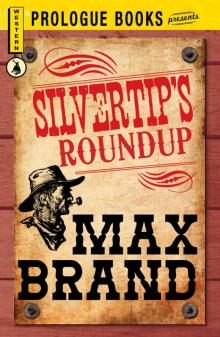 Silvertip's Roundup
Silvertip's Roundup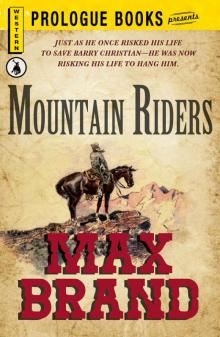 Mountain Riders
Mountain Riders Silvertip (1942)
Silvertip (1942)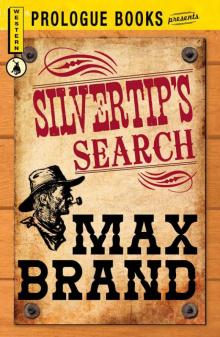 Silvertip's Search
Silvertip's Search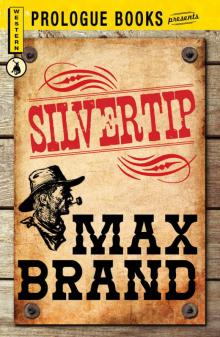 Silvertip
Silvertip Bull Hunter
Bull Hunter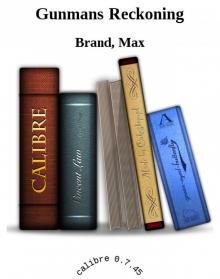 Gunmans Reckoning
Gunmans Reckoning The Seventh Man
The Seventh Man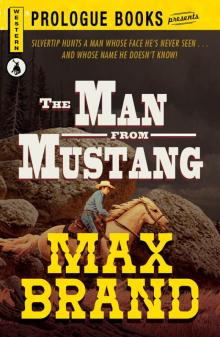 Man From Mustang
Man From Mustang Riders of the Silences
Riders of the Silences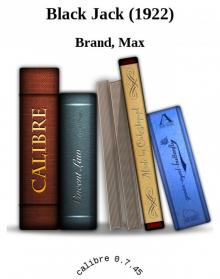 Black Jack (1922)
Black Jack (1922) Way of the Lawless
Way of the Lawless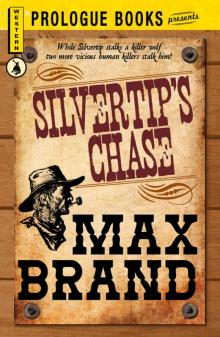 Silvertip's Chase
Silvertip's Chase Trailin
Trailin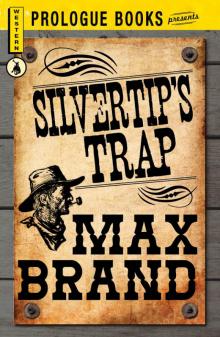 Silvertip's Trap
Silvertip's Trap Ronicky Doone (1921)
Ronicky Doone (1921) The Night Horseman
The Night Horseman the Garden Of Eden (1963)
the Garden Of Eden (1963)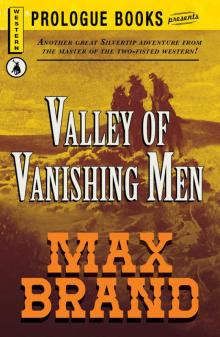 Valley of the Vanishing Men
Valley of the Vanishing Men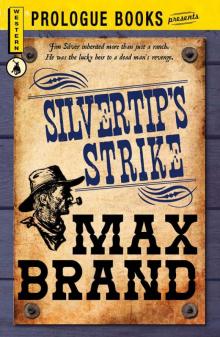 Silvertip's Strike
Silvertip's Strike Black Jack
Black Jack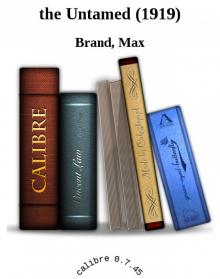 the Untamed (1919)
the Untamed (1919) Way Of the Lawless (1921)
Way Of the Lawless (1921) The Untamed
The Untamed